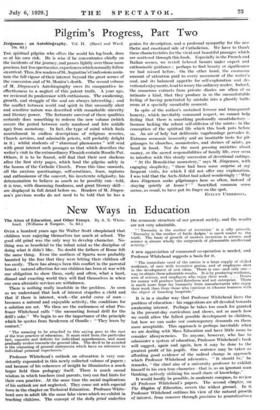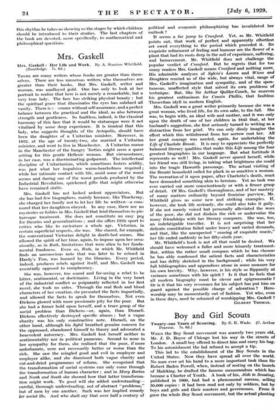New Ways in Education
The Aims of Education, and Other Essays. By A. N. White- head. (Williams & Norgate. 7s. 6d.) OVER a hundred years ago Sir Walter Scott complained that children were enjoying themselves too much at school. The good old grind was the only way to develop character. No- thing was so beneficial to the infant mind as the discipline of
doing what it didn't like. No doubt the fathers of Rome felt the same thing. Even the mothers of Sparta were probably haunted by the fear that they were letting their children off too easily. There has always been this conflict in the parental breast : natural affection for our children has been at war with- our obligation to show them, early and often, what a hard, dismal and exacting world they will find themselves in when our own altruistic services are withdrawn.
There is nothing really insoluble in the problem. As soon as we understand that lack of interest stupefies a child and that if there is interest, work—the awful curse of man— becomes a natural and enjoyable activity, the conditions for a solution are set. We then see the uselessness of what Pro- fessor Whitehead calls "the nauseating formal drill for the drill's sake." We begin to see the importance of the principle which he quotes from Sanderson of Oundle : "They learn by contact."
"The meaning to be attached to this saying goes to the root of the true practice of education. It must start from the particular fact, concrete and definite for individual apprehension, and must gradually evolve towards the general idea. The devil to be avoided is the cramming of general statements which have no reference to individual personal experiences."
Professor Whitehead's outlook on education is very con- sistently expounded in this newly collected volume of papers ; and because of his coherence of insight he illuminates a much larger field than pedagogy itself. There is much casual wisdom in which teachers (and parents, too) can find hints for their own practice. At the same time the social implications of his outlook are notneglected. They come out with especial force in the chapter on Technical Education. Professor White-
head sees in adult life the same false views which we exhibit in teaching children. The concept of the daily grind underlies
the economic structure of our present society, and the results are not very admirable.
"'Necessity is the mother of invention' is a silly proverb. 'Necessity is the mother of futile dodges' is much nearer to the truth. The basis of growth of modern invention is science, and science is almost wholly the outgrowth of pleasurable intellectual activity."
A new appreciation of communal co-operation is needed. and Professor Whitehead suggests a basis for it.
"The immediate need of the nation is a large supply of skilled workmen, of men with inventive genius, and of employers alert in the development of new ideas. There is one—and only one— way to obtain these admirable results. It is by producing workmen, men of science, and employers who enjoy their work. . . . Desire for money will produce hard-fistedness and not enterprise. There is much more hope for humanity from manufacturers who enjoy their work than from those who continue in irksome business with the object of founding hospitals."
It is in a similar way that Professor Whitehead faces the problem of education : his suggestions arc all devoted towards awakening interest. Perhaps he takes too much for granted in the present-day curriculum and shows, not so much how we could allow the fullest possible development to children, but how we can make our contemporary demands on them more acceptable. This approach is perhaps inevitable when we are dealing with Mass Education and have little room to
consider idiosyncrasies. To anyone, however, who has to administer a system of education, Professor Whitehead's book
will suggest, again and again, how it may be done to the greatest profit of his pupils. One sentence may be taken as affording good evidence of the radical change in approach which Professor Whitehead advocates. "It should be," he remarks, the chief aim of a university professor to exhibit himself in his own true character—that is, as an ignorant man thinking, actively utilizing his small share of knowledge." It would hardly be possible, in moderate compass, to review
all Professor Whitehead's papers. The second chapter, on The Rhythm of Education, covers the widest ground. In it Professor Whitehead outlines his view of the natural growth of interest, from romance through precision to generalization
this rhythm he takes as showing us the stages by which children should be introduced to their studies. The last chapters of the book are devoted, more specifically, to mathematical and philosophical questions.











































 Previous page
Previous page